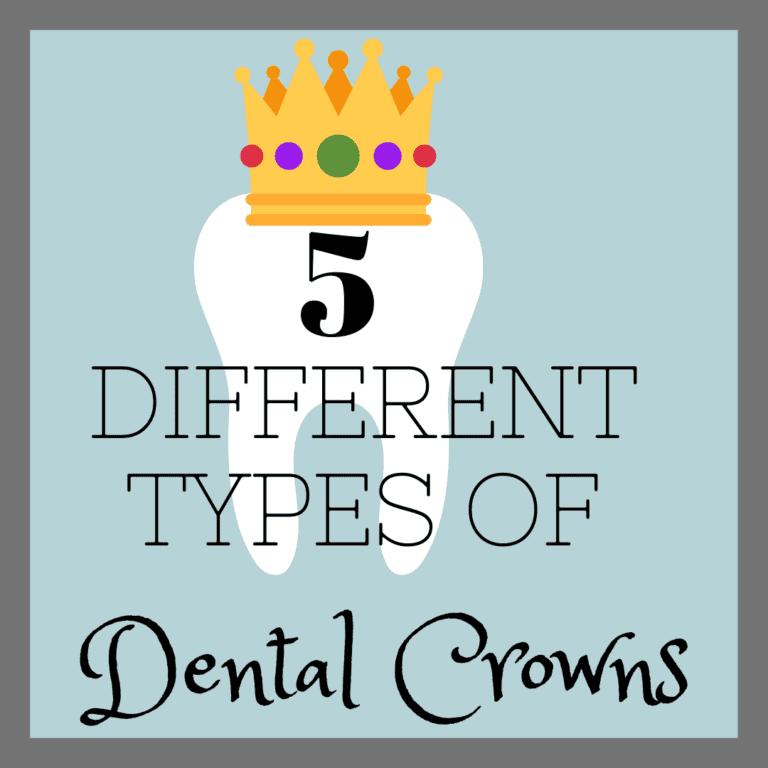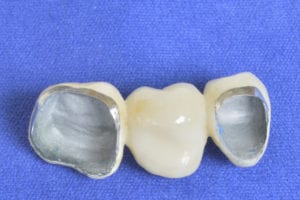5 Different Types of Dental Crowns

Dental crowns, also sometimes referred to as dental caps, are a commonly used dental prosthesis to restore damaged, decayed, or missing teeth. Teeth that have damage or decay that is too severe to be restored with a dental filling or composite bonding are usually restored with dental crowns, as are teeth that have undergone root canals. To restore a missing tooth with a dental crown, a dental implant must first be placed in the gums to act as an anchor point.
When placing a dental crown, your dentist will numb the tooth to keep you comfortable. Then, they will file down the natural tooth structure into the proper shape to accommodate a dental crown. This step is essential so that the dental crown will not affect your bite by being too bulky. Once the tooth structure has been prepared, a dental impression will be taken, sent to a dental lab, and used to fabricate the final restoration. Until the permanent dental crown is adhered to the tooth, a temporary crown will be worn to protect the tooth.
There are a variety of dental materials used for dental crown fabrication. Before your dental crown is fabricated, your dentist may ask if you have a preference for the type of material. Here are the five different types of dental crowns to choose from:
Stainless Steel
Dental crowns made from stainless steel are an appropriate choice for a child who is in need of a dental crown for a primary tooth. When stainless steel crowns are used for adults, it is generally only for a temporary dental crown. Temporary dental crowns are required between the tooth preparation appointment and the permanent crown placement appointment to protect the exposed tooth structure. If your dentist offers same-day crowns, then a temporary crown may not be needed at all.
Metal
Metal crowns are the strongest type of dental crown that is not abrasive to the opposing teeth. They can be fabricated from multiple metals like platinum, gold, copper, and base metal alloys, cobalt-chromium and nickel-chromium. Most metal crowns are a mixture of metals and primarily contain base metal alloys. In most cases, metal crowns are used to restore molars because of their strength, metallic appearance, and the fact that they are not visible when smiling. Other than the fact that some people may be allergic to metal, other people avoid metal crowns because of their appearance and the fact that they corrode over time.

Porcelain Fused to Metal (PFM)
PFM crowns are similar to metal crowns with the exception that they are fabricated with a porcelain coating over a metal base. PFM restorations are highly popular because they offer the same strength as metal crowns with the aesthetics of porcelain crowns. Unlike metal crowns, however, PFM crowns are abrasive to the opposing teeth and can cause them to wear down faster. Another concern with PFM crowns is the fact that gum recession can allow the metal ring to show.
All-Porcelain Crowns
Dental crowns fabricated entirely using porcelain or ceramic materials are known appropriately as all-porcelain or all-ceramic crowns. This type of dental crown is commonly recommended for dental patients who are allergic to metals. They are also ideal for cosmetic dentistry treatments because of their ability to improve the contour and color of teeth. All-porcelain crowns offer patients a naturally, aesthetic restoration option. Although porcelain crowns lack the strength of PFM crowns but are just as abrasive on opposing teeth.
All-Resin
Dental crowns fabricated entirely out of dental composite resin are another metal-free, aesthetic option that is highly affordable. However, resin dental crowns are significantly weaker than other types of dental crowns and are more likely to chip or crack, as well as to wear down faster.
Overall, dental crowns can be fabricated from a variety of dental materials like stainless steel, metal, porcelain fused to metal, porcelain, and resin. Each type of dental crown has various pros and cons that need to be carefully evaluated before deciding on a permanent restoration. Depending on your individual dental needs, your general dentist will likely provide you with advice on which type of dental crown will work best for you.






Recent Comments